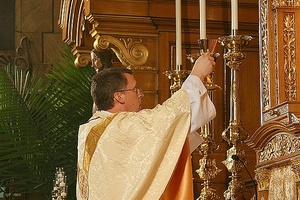 We are now preparing for the ordinations of men to the Order of Deacon and to the Order of Priests this time of year. With these ecclesial events, there is generally a lot of misunderstanding as to what is permitted, what is not, and who can restrict what. Imagine: liturgical and ecclesiological confusion in the Church!
We are now preparing for the ordinations of men to the Order of Deacon and to the Order of Priests this time of year. With these ecclesial events, there is generally a lot of misunderstanding as to what is permitted, what is not, and who can restrict what. Imagine: liturgical and ecclesiological confusion in the Church! Recently in Catholic priesthood Category
 We are now preparing for the ordinations of men to the Order of Deacon and to the Order of Priests this time of year. With these ecclesial events, there is generally a lot of misunderstanding as to what is permitted, what is not, and who can restrict what. Imagine: liturgical and ecclesiological confusion in the Church!
We are now preparing for the ordinations of men to the Order of Deacon and to the Order of Priests this time of year. With these ecclesial events, there is generally a lot of misunderstanding as to what is permitted, what is not, and who can restrict what. Imagine: liturgical and ecclesiological confusion in the Church! On January 14, Monsignor Massimo Camisasca admitted several men to Candidacy. This means those who are asking to be ordained priests in the Missionary Fraternity of Saint Charles Borromeo. Monsignor is the founder and Superior General. The reason I am posting this homily is because of Monsignor Camisasca's imagery of the house of God and the invitation given to enter. He sets the stage of what priesthood is about... Where do you remain, and with whom? Where is your joy?
To introduce us to the profound meaning of what happens to you today and in reflex to us, let us place ourselves on the same wavelength of the question that Andrew and John directed to Jesus: Master, where do you live? (Jn 1.38).
As well as this evening we also ask: "Where do you live?". To be able to stay with Him, we must know where he lives. Your "yes" today is placed on the path that you are completing here in the seminary, a path in which you learn where Jesus lives and how to stay with him. To know Jesus, to know Him interiorly, profoundly, to experience him constitutes the fullness of our existence.
A dear friend of mine, Father Richard Cipolla published an article today in the Wall Street Journal on what it means for a faithful Christian to belong to Christ faithfully, moving from an Episcopal Church to full communion with the Catholic Church and being a married Catholic priest. The life of sacrifice and joy is clear in Cipolla's story. For me, it is a testament of grace to know Father Richard and his wife, Cathy, and to have met his children. Wouldn't be good if all the clergy could say that with conviction and love. Last week Father Richard celebrated his anniversary of ordination to the Catholic priesthood on January 28 in the Diocese of Bridgeport. Let us pray for him and Holy Mother Church.
The WSJ article follows:
Being a Catholic Priest--and Married
The pope has created a new diocese for bringing Episcopalians into the church.
By Richard Cipolla
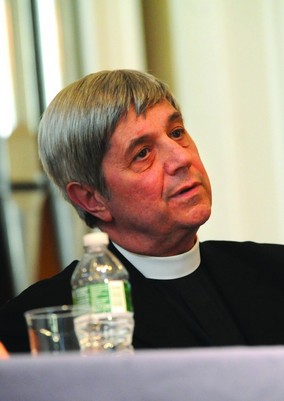
Last month, Pope Benedict announced the formation of an American "ordinariate," or special diocese for Episcopal congregations that want to move to Roman Catholicism (driven largely by Episcopalianism's liberal drift). These congregations, the pope ruled, could keep some of their Anglican liturgy. More significantly, a small but sizable number of married Episcopal priests will now become married Catholic priests.
As a married Catholic priest ordained in 1984 under a special provision set forth by Pope John Paul II (for individual priests, judged on an individual basis), I have closely followed Pope Benedict's announcement. I rejoice in this catholic and generous gesture by the pope and am overjoyed that these priests and their families will be welcomed into the Catholic Church. But that is not to say it won't bring its own share of challenges.
My experience as a married Catholic priest for 28 years brings to mind several thoughts, both practical and spiritual. First, the church must support new priests' families financially. During my first years as a married Catholic priest, there were times when we could not pay the heating bill. When I was ordained, it was made quite clear to me that I should not look to the church as my main source of income but rather to a full-time job outside of the church. My parish duties have thus always been secondary.
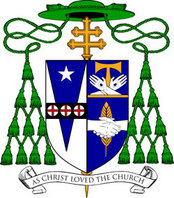
Yesterday's installation of Archbishop Charles J. Chaput as the new Archbishop of Philadelphia was beautiful on all avenues: music, word, gersture. One of many beautiful parts of his homily was on the ministry (vocation) of the bishop. For that part he quoted the great bishop and Doctor of the Church, Saint Augustine of Hippo. You may think I am cynical by saying this, but I wonder sometimes how often our bishops live up to their vocation as the Church has expected and how often they reflect on the words of a brother such as the eminent Augustine. Perhaps not often enough. AND that is likely the reason Archbishop Charles mention the vocation his homily.
What follows is a terrfic teaching on this vitally vigorous vocation of the Church.
Thanks be to God for the Archbishop!
St. Augustine of Hippo, speaking in the 4th century captured the role of the bishop in these words:
"Jerusalem had watchmen who stood guard . . . And this is what bishops do. Now, bishops are assigned this higher place" -- the bishop's chair in the basilica -"so that they themselves may oversee and, as it were, keep watch over the people. For they are called episkopos in Greek, which means 'overseer,' because the bishop oversees; because he looks down from [his chair] . . . And on account of this high place, a perilous accounting will have to be rendered [by the bishop] - unless we stand here with a heart such that we place ourselves beneath your feet in humility."
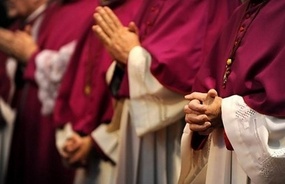
Another time, on the anniversary of his episcopal ordination, Augustine described the bishop's duties in the following way:
"To rebuke those who stir up strife, to comfort those of little courage, to take the part of the weak, to refute opponents, to be on guard against traps, to teach the ignorant, to shake the indolent awake, to discourage those who want to buy and sell, to put the presumptuous in their place, to modify the quarrelsome, to help the poor, to liberate the oppressed, to encourage the good, to suffer the evil and to love all men."
It's crucial for those of us who are bishops not simply to look like bishops but to truly be bishops. Otherwise, we're just empty husks -- the kind of men Augustine meant when he said,
"You say, 'He must be a bishop for he sits upon the cathedra.' True - and a scarecrow might also be called a watchman in the vineyard."
The past few weeks have proved to be a most confusing time trying to figure out the assertions made against the "former Father John Corapi" now taking a leave from ministry. Today, a "Press Release Concerning Fr John Corapi from SOLT Regional Priest Servant" was released. It is a disturbing piece of information but something that deserves our time, patience and prayer. Someone accused me of misjudging Corapi when the allegations surfaced; my only response is that it is possible that a former addict could have a relapse. We need to exhibit Christian forgiveness and beg God for His Mercy. We need to beg the Holy Spirit to warm John Corapi's heart to return to the regular observance of his vowed religious life. Here's the text:
From: Rev. Gerard Sheehan, SOLT Regional Priest Servant Society of Our Lady of the Most Holy Trinity Robstown, Texas
Fr. John A. Corapi submitted his resignation from the Society of Our Lady of the Most Holy Trinity ("SOLT") early in June. SOLT is a Society of Apostolic Life of Diocesan Right with its regional office in Robstown, Texas.
While SOLT does not typically comment publicly on personnel matters, it recognizes that Fr. John Corapi, through his ministry, has inspired thousands of faithful Catholics, many of whom continue to express their support of him. SOLT also recognizes that Fr. Corapi is now misleading these individuals through his false statements and characterizations. It is for these Catholics that SOLT, by means of this announcement, seeks to set the record straight.
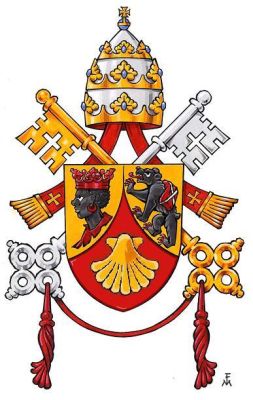
The Church celebrates today great solemn feast of Saints Peter and Paul, it is also the 60th anniversary of Pope Benedict's priestly ordination as well as the day the See of Constantinople sends a delegation to Rome to pray at the tombs of the two great saints and to meet with the Pope. Plus, it is the day in which the metropolitan archbishops who have been appointed in the last calendar year come to Rome to receive the palium (see below). The USA has for archbishops receiving their pallium today: San Antonio, Oklahoma City, Seattle and Los Angelos. All four of these archbishops are under 60. Watch the video clip.
"Non iam dicam servos, sed amicos" - "I no longer call you servants, but friends" (cf. Jn 15:15).
Sixty years on from the day of my priestly ordination, I hear once again deep within me these words of Jesus that were addressed to us new priests at the end of the ordination ceremony by the Archbishop, Cardinal Faulhaber, in his slightly frail yet firm voice. According to the liturgical practice of that time, these words conferred on the newly-ordained priests the authority to forgive sins. "No longer servants, but friends": at that moment I knew deep down that these words were no mere formality, nor were they simply a quotation from Scripture. I knew that, at that moment, the Lord himself was speaking to me in a very personal way. In baptism and confirmation he had already drawn us close to him, he had already received us into God's family. But what was taking place now was something greater still. He calls me his friend. He welcomes me into the circle of those he had spoken to in the Upper Room, into the circle of those whom he knows in a very special way, and who thereby come to know him in a very special way. He grants me the almost frightening faculty to do what only he, the Son of God, can legitimately say and do: I forgive you your sins. He wants me - with his authority - to be able to speak, in his name ("I" forgive), words that are not merely words, but an action, changing something at the deepest level of being. I know that behind these words lies his suffering for us and on account of us. I know that forgiveness comes at a price: in his Passion he went deep down into the sordid darkness of our sins. He went down into the night of our guilt, for only thus can it be transformed. And by giving me authority to forgive sins, he lets me look down into the abyss of man, into the immensity of his suffering for us men, and this enables me to sense the immensity of his love. He confides in me: "No longer servants, but friends". He entrusts to me the words of consecration in the Eucharist. He trusts me to proclaim his word, to explain it aright and to bring it to the people of today. He entrusts himself to me. "You are no longer servants, but friends": these words bring great inner joy, but at the same time, they are so awe-inspiring that one can feel daunted as the decades go by amid so many experiences of one's own frailty and his inexhaustible goodness.
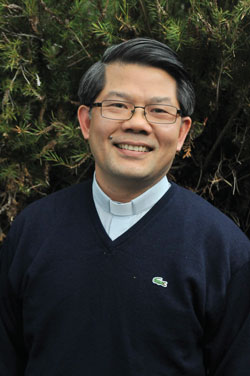 The Church in Melbourne, Australia saw the Holy Spirit
consecrate a former boat person turned Conventual Franciscan priest turn
auxiliary bishop on Thursday. The witness of his life is testimony of the hand of God leading.
The Church in Melbourne, Australia saw the Holy Spirit
consecrate a former boat person turned Conventual Franciscan priest turn
auxiliary bishop on Thursday. The witness of his life is testimony of the hand of God leading. 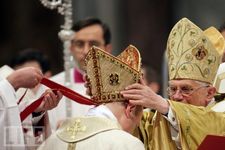
The Holy Father ordained 5 priests to the episcopacy today on the liturgical memorial of Saint Agatha at the Vatican Basilica. The priests are:
Father Savio Hon Tai-Fai, 61, a Salesian of Saint John Bosco, elected titular archbishop of Sila and nominated Secretary of the Congregation of the Evangelization of Peoples.
Father Marcello Bartolucci, 67, a priest of the Diocese of Assisi-Nocera Umbria-Gualdo Tadino, elected titular archbishop of Bevagna and nominated Secretary of the Congregation of the Causes of Saints.
Father Celso Morga Iruzubieta, 63, a priest of the Diocese of Calahorra y La Calzada-Logroño, elected titular archbishop of Alba Marittima and nominated Secretary of the Congregation of the Clergy.
Father Antonio Guido Filipazzi, 48, a priest of the Diocese of Ventimiglia-San Remo, elected titular archbishop of Sutri and nominated Apostolic Nuncio.
Father Edgar Peña Parra, 51, a priest
of the Archdiocese of Maracaibo, elected titular archbishop of Telepte and
nominated Apostolic Nuncio in Pakistan.
May the saints intercede for these men.
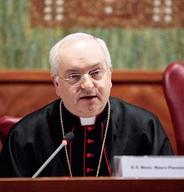 Mauro Cardinal Piacenza, Prefect of the Congregation of Clergy, is focusing on the life of the priest and how the Catholic priest lives the vocation given to him by the Holy Spirit. Piacenza is doing all he can to strengthen priesthood in all its vigor and beauty. In the style and content of Benedict XVI, Piacenza is calling for a Catholic reform of the priesthood, a reform that returns to the source. He said,
Mauro Cardinal Piacenza, Prefect of the Congregation of Clergy, is focusing on the life of the priest and how the Catholic priest lives the vocation given to him by the Holy Spirit. Piacenza is doing all he can to strengthen priesthood in all its vigor and beauty. In the style and content of Benedict XVI, Piacenza is calling for a Catholic reform of the priesthood, a reform that returns to the source. He said, 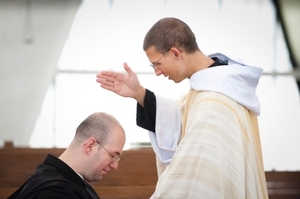
Preaching the first Mass of a newly ordained member of his monastic community, Benedictine Father Ambrose Bennett cited "Emmanuel Cardinal Suhard, who served as Archbishop of Paris in the post-war years, expressed this mystery [of the priesthood] very eloquently in a beautiful pastoral letter that he wrote to his priest on Holy Thursday of 1949:
At the altar, the priest, like Christ, is the [sacrificial] victim. But he is also the sacrificer; he is then the dreadful man, the one who works death, the one who slays sin and burns it, the one who is crucified and who crucifies, the one who cannot save the world, nor will consent to its salvation, save through nailing it to the Cross. "Without the shedding of blood there is no redemption" (Heb. 9.22)... That is why the priest in relation to society must always be somehow or other its adversary. He will never be forgiven for recalling and perpetuating, from generation to generation, Christ, whom they thought they had suppressed forever... Far from being a fatherly adviser or a good-natured citizen, a priest is, like God, a terrible being. He is a fighting man... Like Saint Michael, he challenges the Dragon, dragging him out of ambush by healing men's hearts, so as to crush one by one his ever resurgent heads. Although it is too frequently overlooked, a priest is an exorcist...; he has the power and the duty of expelling the Devil (Cardinal Suhard, Priests Among Men, pp. 82-83; 44-45).
The Introduction
The historical background: Historical Intro SST.pdf
The letter to the bishops: SST letter to bps.pdf
The Norms (Normae de Gravioribus Delictis)
The changes made; Summary of SST modifications.pdf
Today, the Holy Father who is making a pilgrimage to the Shrine of Our Lady of Fatima (Portugal) made this consecration of for himself and all priests to the Blessed Mother, Mother of God, Mother of Priests, Mother of the Blessed Sacrament. The Pope's prayer is presented here for all priests to pray at the Mary Altar.
Immaculate Mother, in this place of grace, called together by the love of your Son Jesus
the Eternal High Priest, we, sons in the Son and his priests, consecrate ourselves to your maternal Heart, in order to carry out faithfully the Father's Will.
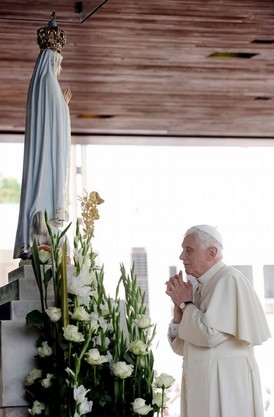
We are mindful that, without Jesus, we can do nothing good (cf. Jn 15:5) and that only through him,with him and in him, will we be instruments of salvation for the world.
Bride of the Holy Spirit, obtain for us the inestimable gift of transformation in Christ. Through the same power of the Spirit that overshadowed you, making you the Mother of the Savior, help us to bring Christ your Son to birth in ourselves too. May the Church be thus renewed by priests who are holy, priests transfigured by the grace of him who makes all things new.
Mother of Mercy, it was your Son Jesus who called us to become like him: light of the world and salt of the earth (cf. Mt 5:13-14).
Help us, through your powerful intercession, never to fall short of this sublime vocation, nor to give way to our selfishness, to the allurements of the world and to the wiles of the Evil One.
Preserve us with your purity, guard us with your humility and enfold us with your maternal love that is reflected in so many souls consecrated to you, who have become for us true spiritual mothers.
Mother of the Church, we priests want to be pastors who do not feed themselves but rather give themselves to God for their brethren, finding their happiness in this. Not only with words, but with our lives, we want to repeat humbly, day after day, our "here I am."
Guided by you, we want to be Apostles of Divine Mercy, glad to celebrate every day the Holy Sacrifice of the Altar and to offer to those who request it the sacrament of Reconciliation.
Advocate and Mediatrix of grace, you who are fully immersed in the one universal mediation of Christ, invoke upon us, from God, a heart completely renewed that loves God with all its strength and serves mankind as you did.
Repeat to the Lord your efficacious word: "They have no wine" (Jn 2:3), so that the Father and the Son will send upon us a new outpouring of the Holy Spirit. Full of wonder and gratitude at your continuing presence in our midst, in the name of all priests I too want to cry out: "Why is this granted me, that the mother of my Lord should come to me?" (Lk 1:43).
Our Mother for all time, do not tire of "visiting us", consoling us, sustaining us. Come to our aid and deliver us from every danger that threatens us. With this act of entrustment and consecration, we wish to welcome you more deeply, more radically, for ever and totally into our human and priestly lives.
Let your presence cause new blooms to burst forth in the desert of our loneliness, let it cause the sun to shine on our darkness, let it restore calm after the tempest, so that all mankind shall see the salvation of the Lord, who has the name and the face of Jesus,
who is reflected in our hearts, for ever united to yours!
Amen.
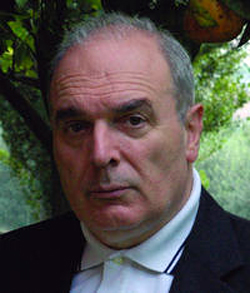 On February 26th Zenit published an article by Father Massimo Camisasca looking at what he considers to be the pillars (prayer & Liturgy) of priestly reform in the Catholic Church. Reading a bit of Church history recently there's been a lot to consider when thinking about the state of the Catholic Church viz. the rise of Portestantism and then the decline of the Christian religion in some parts of the
On February 26th Zenit published an article by Father Massimo Camisasca looking at what he considers to be the pillars (prayer & Liturgy) of priestly reform in the Catholic Church. Reading a bit of Church history recently there's been a lot to consider when thinking about the state of the Catholic Church viz. the rise of Portestantism and then the decline of the Christian religion in some parts of the
Statistical data of the past 30 years reveals an increase of 5% more diocesan priests worldwide, compared with an increase of 48% more baptized persons.
This alone could explain the question in the title of my latest book, "Padre ci saranno ancora sacerdoti nel futuro della Chiesa?" (Father, Will There Still Be Priests in the Future of the Church?) -- a theme that underlies the entire text.
However, even more than the number of priests, the Church is interested in the truth of their experience. For reasons connected with my work as superior of a fraternity of missionaries, I travel throughout the world and am in contact with the most diverse realities. And, meeting with priests of different regions, I note that many of them experience difficulties not so much of an ideological type as of an emotional order.
Why is it that today the priestly life -- which has made thousands of men happy and contributed enormously to the spiritual growth of humanity -- is going through such a profound qualitative crisis?
My [Italian-language] book stems from this question. It is an attempt to rethink the life of a priest from its roots.
Rebirth
The regeneration of priestly life is one of the conditions for the new flowering of Christianity in
I have attempted to trace the path for a rebirth returning to the fundamentals of the priesthood. I find one of those fundamentals in prayer.
Today many priests lose themselves in action, in the infinite number of activities and preoccupations that entrap them. For the action of each one of us to always be a source of nourishment, it must be constantly redirected to our relationship with Christ. And the place of our relationship with Christ is prayer, inseparable from silence.
Silence, prayer, reflection and study are the answer to one of the evils that afflict the figure of the priest: activism, which remains on the surface of things and absorbs the time of our energies and our feelings. Instead, action that stems from charity introduces us in the work of God, who precedes and exceeds us.
Liturgy
Another pillar of the renewal of priestly life is the liturgy. I say this following the teaching of the Pope. I am not ruled by the desire to accommodate myself to a current, but by a profound conviction that is born from experience.
If the priest does not rediscover the true meaning of the liturgy in his life, he cannot find himself.
Surmounting the process of trivialization, which we have witnesses in the last 30 years, it is necessary to return to that "fons et origo" that the Second Vatican Council identifies in the liturgy.
When it is faithful to the one who instituted it, when it is lived in all its rigorous totality and is attentive to the tradition of the Church, the liturgy is the place of education to communion.
The protagonist of the liturgy is Christ. By living the liturgy, we can enter into the life of God, and only thus can we priests be an effective company of men.
In the third place, the emotional question is central in the life of a priest. Loneliness is the other great evil that today afflicts thousands of priests.
Only by discovering himself a son can the priest be a father.
Friendship is a positive experience in a person's emotional life. In the Church there is still much fear of friendship. Pathologies are not channeled if one is not helped to develop a healthy life.
Unhealthy and negative friendships, which because of this are not proper friendships, must not close us off from the essential value of these bonds of preference that open us to the love of others and help us to understand who God is.
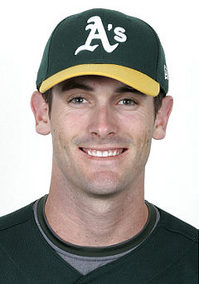 Making the rounds is the story that a top baseball player is following his true love, Jesus Christ by becoming a Catholic priest. Grant Desme, 23, is leaving the Oakland A's for Saint Michael's Abbey, a Norbertine community of priests and brothers in southern California. The community of Saint Michael's is young, dynamic and they think with the Church...no surprise they're getting vocations. Famous for their white habit and white biretta, the Canons Regular of Premontre were founded by Saint Norbert c. 1121.
Making the rounds is the story that a top baseball player is following his true love, Jesus Christ by becoming a Catholic priest. Grant Desme, 23, is leaving the Oakland A's for Saint Michael's Abbey, a Norbertine community of priests and brothers in southern California. The community of Saint Michael's is young, dynamic and they think with the Church...no surprise they're getting vocations. Famous for their white habit and white biretta, the Canons Regular of Premontre were founded by Saint Norbert c. 1121.
